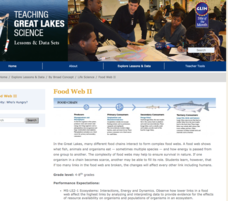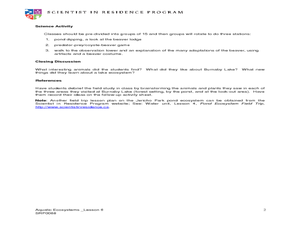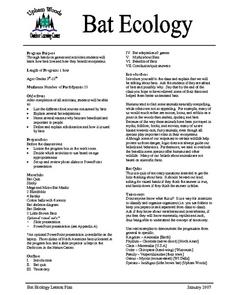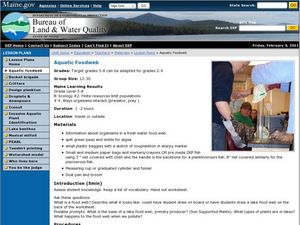Curated OER
EcoFluxx
Students describe examples of predator/prey relationships in nature explain how some animals protect themselves from predation better follow all directions presented to them become more flexible, adaptable and literate learners. They...
Michigan Sea Grant
Food Web II
A food web consists of complex food chains and the more complex the web, the better likelihood of survival. Learners compare and contrast food webs and food chains and discuss concepts like the predator-prey and consumer-producer...
Curated OER
Dinner in a Woodland
After reading a short paragraph about what makes up a woodland habitat, fifth graders attempt to identify the primary consumers, secondary consumers, and third order consumers in two separate food chain scenarios. They also name a hawk's...
Curated OER
Silent Stalking
Students simulate predators and prey. In this predators and prey lesson, students analyze adaptive behaviors of both predators and prey. Students role-play animals in a game scenario.
Curated OER
Sound Off!
Students investigate the sounds animals make as they communicate. In this animal communication lesson, students play a game in which they simulate animal sounds. They attempt to find their animal partner before being captured by a predator.
Curated OER
Kure Waste Chase Game Lesson
Students work together to identify marine debris. They explain the effect of the debris on various ecosystems. They draw different types of ocean currents as well.
American Museum of Natural History
Wonderful World of Wasps
Shockingly, wasps sometimes challenge lions as the king of predators! Learners explore the life of a wasp in an interactive online lesson. They read about the characteristics of wasps and then complete activities to learn about their lives.
Curated OER
Water's Edge Café
Students observe water birds feeding at a local wetland, record what they see, and construct an appropriate menu for a "Waterfowl Cafe." They also play a "flocking" game.
Curated OER
Oh Panther
Students play a game that replicates the balance of prey and predators in an ecosystem. For this physical education lesson, students follow the instructions to play "Oh Panther!" Students collect data regarding the game and discuss the...
Berkshire Museum
Camouflage!: Collecting Data and Concealing Color
Help young scholars see the important role camouflage plays in the survival of animals with a fun science lesson. Starting with an outdoor activity, children take on the role of hungry birds as they search for worms represented by...
Curated OER
Burnaby Lake Field Trip
Students identify different organisms found in the lake ecosystem. In this life science instructional activity, students discover the predator-prey relationship through a game. They explain how beavers adapt to the environment over time.
Curated OER
Saved by a Shark
Young scholars explore the marine ecosystem and the importance of sharks. In this shark lesson, students look at photos of the Flower Garden Banks National Marine Sanctuary and discuss the animals that live there. They discuss which...
Curated OER
Management of Wildlife Resources
Young scholars investigate how wildlife management policies affect the size of large animal populations. They develop a spreadsheet that incorporates a mathematical model to predict big game herd sizes, and using worksheet data manage a...
Curated OER
Guess Who?
Getting ready for a lesson on animal adaptations can be a lot of fun. Kindergartners will go on an egg hunt. Once they have collected all the eggs, they will open them up to reveal an image of an animal. Each pupil will act out...
Curated OER
Sharks and Fishes
Learners explain the role of the school of fish as the prey and the shark as the predator, as they participate in the game Sharks and Fishes. They demonstrate quick physical movement, and trickery, by sucessfully staying away from the...
Curated OER
Bat Ecology
Students, through hands on games and activities, discover how bats live and how bats benefit ecosystems. They play a game designed to show them how echolocation works and another to show how mother bats locate their young through their...
Curated OER
the Journey of the Pacific Salmon in the Open Ocean and Fishing
Third graders discuss salmon and their life cycle. In this salmon life cycle lesson, 3rd graders recognize the difficulties researching the life cycle of salmon as they migrate. Students conduct an experiment and create a game.
Curated OER
It's a Jungle Out There: How Species Survive in the Jungle
Students investigate the different adaptation and skills of jungle species. In this ecology lesson, students play an interactive online game where they match species with their adaptation. They research about a specific adaptation and...
Curated OER
Blue Planet: Seas of Life - Tidal Seas
After viewing the video Blue Planet: Seas of Life, learners review oceanic concepts. In this earth science lesson, students reflect on the effect tides have on living things and conduct research to create a "tidal trivia" game....
Curated OER
Food Chains
Fourth graders study food chains, producers, consumers, and decomposers. They play a food chain game and create food chain mobiles or posters. They take a nature hike around the school and observe various parts of a food chain.
Curated OER
What is a Raptor?
Students explore, analyze and discover the characteristics of raptors and generate a word bank for owls and raptors. They identify attributes shared by raptors and practice various key vocabulary words to master and utilize in sentence...
American Museum of Natural History
Being a Zoologist: Sandra Olsen
Are your students wild about horses? Then introduce them Sandra Olsen, a zooarchaeologist, who has been studying horses and the people who herd them. Ms Olsen responds to 15 interview questions and details how she goes about her...
Curated OER
Aquatic Food Webs
Young scholars discuss producers, herbivores, omnivores, carnivores, and decomposers and analyze the difference between food chains and food webs. They participate in a food web yarn game, examining what can effect the breakdown of the web.
Curated OER
Aquatic Foodweb
Learners explore what a food web is. In this science lesson, students examine how nutrients and other pollutants enter a lake and play a food web game whereby learners pretend they are either zooplankton, planktivore,...























